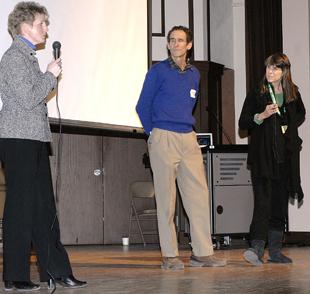
Garcia - widow of the late Grateful Dead guitarist Jerry Garcia - spoke in Winona, Minnesota on Sunday afternoon during the final day of the Frozen River Film Festival, and previewed her upcoming film on the relationship between healthy soil and healthy people. The preview suggested that while emerging technologies may replace oil as the fuel of the future, soil is irreplaceable - and increasingly at risk.
Erosion, sprawling development and short-sighted farming techniques are imperiling America's best dirt, including the soil that supports agriculture in the Upper Midwest, said Garcia and other food experts at Sunday's panel discussion. That loss and degradation of soil, in turn, drains the nutrients needed to continue growing healthy food for years to come, the speakers suggested
But Garcia sees hope in what she called an increasing interest by young Americans in healthier eating and more sustainable methods of agriculture.
"There's a lot of activism around food that young people are really keying into," Garcia said.
Photographer and horticulturalist David Cavagnaro spoke about the importance of genetic diversity in agriculture - a topic central to Garcia's 2004 film, "The Future of Food." Garcia expects her upcoming documentary, "In Good Heart: Soil and the Mystery of Fertility," will be released in early 2010.
Government policy makers must do more to encourage landowners to protect their soil, said organic vegetable farmer Lonny Dietz, who attended Sunday's event. Dietz, who farms near Elba, Minn., said erosion may be the biggest threat to soil in hilly southeastern Minnesota.
But changes made by state lawmakers in 2008 to Minnesota's Green Acres program could lead to increased property taxes on land enrolled in conservation programs, and Dietz said that doesn't make sense.
"People are looking at tearing out conservation practices they put in, because they'll be penalized," Dietz said.



Comment: When a government is run by the rich elite (big agriculture for one), you can forget about said government caring one iota for the health and welfare of the people. They care only for profit and power.
So if you want to be healthy, you pay more taxes!